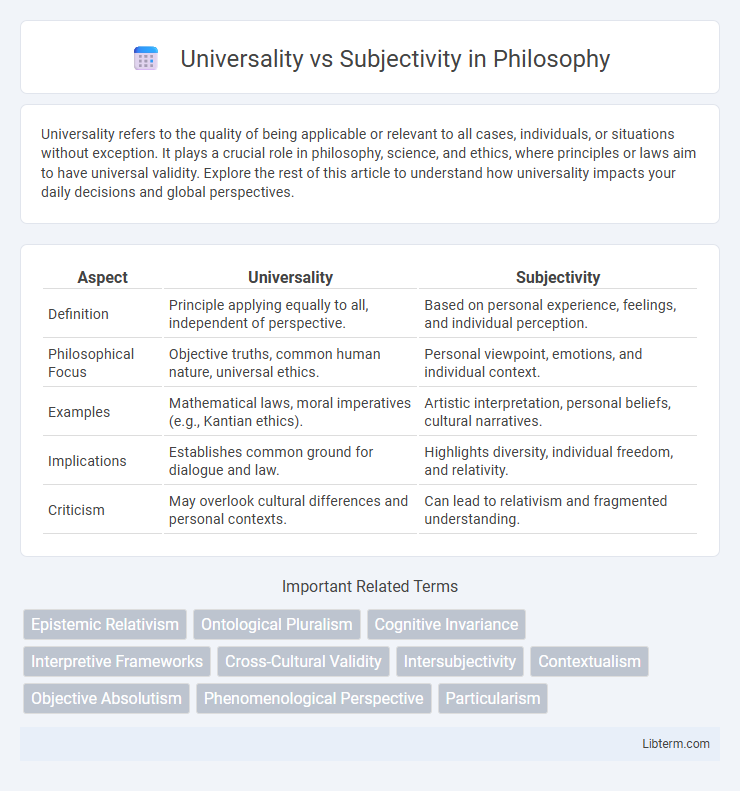Universality refers to the quality of being applicable or relevant to all cases, individuals, or situations without exception. It plays a crucial role in philosophy, science, and ethics, where principles or laws aim to have universal validity. Explore the rest of this article to understand how universality impacts your daily decisions and global perspectives.
Table of Comparison
| Aspect | Universality | Subjectivity |
|---|---|---|
| Definition | Principle applying equally to all, independent of perspective. | Based on personal experience, feelings, and individual perception. |
| Philosophical Focus | Objective truths, common human nature, universal ethics. | Personal viewpoint, emotions, and individual context. |
| Examples | Mathematical laws, moral imperatives (e.g., Kantian ethics). | Artistic interpretation, personal beliefs, cultural narratives. |
| Implications | Establishes common ground for dialogue and law. | Highlights diversity, individual freedom, and relativity. |
| Criticism | May overlook cultural differences and personal contexts. | Can lead to relativism and fragmented understanding. |
Defining Universality: Core Concepts
Universality refers to principles or values that apply consistently across different cultures, contexts, or individuals, reflecting objective standards recognized globally. Core concepts of universality include inherent human rights, fundamental ethical norms, and natural laws that transcend subjective interpretations. Defining universality involves identifying these shared attributes that form the basis for cross-cultural agreement and collective human understanding.
Understanding Subjectivity: A Closer Look
Understanding subjectivity involves recognizing individual perceptions shaped by personal experiences, emotions, and cultural backgrounds, which influence how reality is interpreted. This perspective highlights the variability in human understanding, contrasting with universal principles that seek objective truths independent of personal bias. Emphasizing subjectivity allows for a deeper appreciation of diverse viewpoints and the complexity of human cognition.
Historical Perspectives on Universality vs Subjectivity
Historical perspectives on universality versus subjectivity reveal evolving interpretations of truth and moral values across cultures and epochs. Ancient philosophers like Plato emphasized universal forms and objective ideals, while later thinkers such as David Hume argued for the centrality of subjective experience in knowledge. The Enlightenment period further challenged universality by promoting individual reason and cultural relativism, shaping modern debates on ethics and epistemology.
Philosophical Debates: Objective Truth vs Personal Experience
Philosophical debates on universality versus subjectivity center on the tension between objective truth, which posits that reality and moral values exist independently of individual perceptions, and personal experience, emphasizing the role of individual consciousness in shaping knowledge. The discourse involves figures like Immanuel Kant, who argued for a priori universal principles, contrasted with existentialists such as Jean-Paul Sartre, who highlight subjective human experience as primary. This ongoing dialogue explores whether truths are universally valid or contingent upon cultural, emotional, and perceptual contexts, influencing epistemology and ethics profoundly.
Cultural Influences on Universal and Subjective Values
Cultural influences shape universal and subjective values by embedding distinct norms and beliefs within societies, which can lead to diverse moral frameworks and interpretations of right and wrong. Universal values such as human rights often adapt to cultural contexts, reflecting a blend of shared human principles and localized traditions. Subjective values are more explicitly molded by cultural heritage, language, and social practices, emphasizing the variability of ethical standards across different communities.
Universality in Ethics and Morality
Universality in ethics and morality asserts that certain moral principles apply consistently across all cultures and individuals, grounding ethical frameworks in objective truths rather than personal perspectives. This concept supports the establishment of common human rights and justice standards that transcend cultural relativism and subjective interpretations. Universal ethics enable coherent global cooperation by providing a foundation for evaluating actions based on shared moral values.
Subjectivity in Art and Literature
Subjectivity in art and literature emphasizes individual interpretation, emotions, and personal experiences, making each work uniquely resonant with different audiences. This perspective values the creator's inner world and subjective vision, often prioritizing emotional depth and personal meaning over universal themes. Subjective art invites diverse readings, reflecting varied cultural, psychological, and social contexts that shape how meaning is constructed and understood.
The Role of Science: Universal Laws or Interpretative Frameworks?
Science seeks to uncover universal laws governing natural phenomena through empirical evidence and reproducible experiments, establishing objective truths independent of individual perspectives. However, interpretative frameworks shape the application and understanding of these laws, reflecting cultural, historical, and cognitive contexts that introduce subjectivity into scientific practice. This dynamic interplay emphasizes that while scientific laws strive for universality, their meaning and significance often depend on subjective human interpretation.
Real-World Implications: Societal Norms and Individual Perceptions
Societal norms often reflect universality by establishing shared values and behaviors that promote social cohesion, yet individual perceptions introduce subjectivity that shapes personal interpretations and actions. This interplay affects areas like law, ethics, and cultural practices, where universal standards may clash with diverse individual experiences and beliefs. Understanding the balance between these forces is crucial for creating inclusive policies that respect both collective consensus and personal diversity.
Finding Balance: Reconciling Universality and Subjectivity
Finding balance between universality and subjectivity requires integrating shared human experiences with individual perspectives to create inclusive frameworks. Emphasizing common values while respecting cultural and personal differences fosters understanding across diverse contexts. This reconciliation supports dialogue that honors collective norms without negating unique viewpoints.
Universality Infographic

 libterm.com
libterm.com